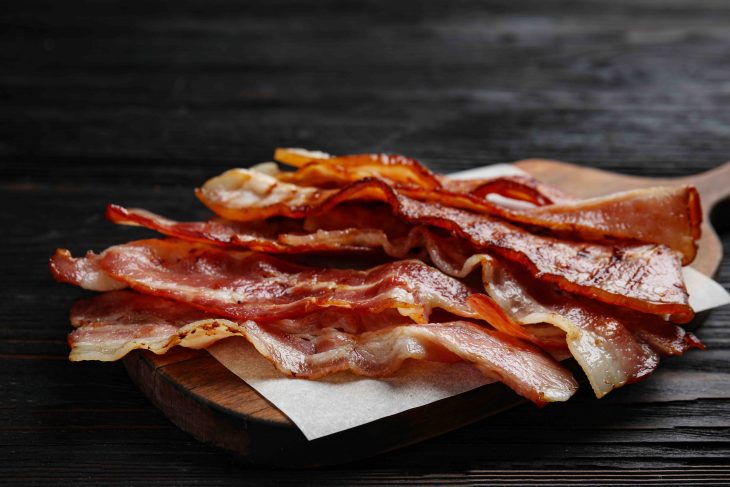
Bacon, with its sizzling aroma and crispy texture, is a beloved food enjoyed by many. Whether paired with eggs for a hearty breakfast or added to sandwiches for extra flavor, bacon has found its way into countless dishes. But have you ever wondered about the nutritional value of that delicious strip of goodness? Let’s explore 10 fascinating bacon nutrition facts per slice that might surprise you.
Calorie Content
A typical slice of bacon (approximately 13 grams) contains about 42 calories. These calories come primarily from fat, making bacon a high-energy food.
Protein Powerhouse
Despite being known for its fat content, bacon also provides a decent amount of protein. On average, a slice of bacon contains about 3 grams of protein. Protein is an essential nutrient that supports muscle growth and repair.
Fat Content
Bacon is known for its rich fat content, which contributes to its flavor and texture. A slice of bacon contains around 3.5 grams of fat, with a mix of saturated and unsaturated fats. While saturated fats should be consumed in moderation, unsaturated fats can have heart-healthy benefits.
Vitamins and Minerals
Bacon contains several essential vitamins and minerals, although in relatively small amounts. It provides small quantities of vitamins B1, B2, B3, B5, B6, and B12, as well as vitamin D. Minerals like phosphorus, magnesium, zinc, and selenium are also present in bacon.
Sodium Sensitivity
One aspect of bacon nutrition to consider is its sodium content. A slice of bacon can contain around 190 milligrams of sodium, which is approximately 8% of the recommended daily intake. Individuals on a low-sodium diet should be mindful of their bacon consumption.
Nitrate and Nitrite Levels
Bacon often contains added nitrates and nitrites, which act as preservatives and contribute to its characteristic flavor. These compounds help inhibit the growth of bacteria and prevent spoilage. However, excessive consumption of nitrates and nitrites has been linked to certain health concerns, so moderation is key.
Cooking Methods and Nutrition

How you cook bacon can affect its nutritional profile. Frying bacon in its own fat may increase its fat content while baking or grilling can reduce it. It’s important to consider the cooking method and portion size when assessing the overall nutritional impact.
Bacon and Weight Management
Due to its high-fat content, bacon is often associated with weight gain. However, when consumed in moderation as part of a balanced diet, bacon can still fit into a healthy eating plan. Portion control and mindful consumption are key factors in managing calorie intake.
Flavor Enhancer
Bacon’s strong and savory flavor can elevate the taste of various dishes. Adding a small amount of bacon to salads, pasta dishes, or vegetables can enhance the overall culinary experience. Remember to balance the flavors and be mindful of the overall nutritional composition of the meal.
Moderation and Enjoyment
Like many indulgent foods, the key to enjoying bacon lies in moderation. While it may not be the healthiest choice for everyday consumption, savoring a slice or two of bacon occasionally can be a delightful treat. Balance it with nutrient-dense foods and an overall healthy lifestyle.
Conclusion
By uncovering these 10 bacon nutrition facts per slice, we hope to shed some light on the nutritional aspects of this beloved food. Remember, enjoying bacon in moderation and as part of a balanced diet can still be a flavorful addition to your meals. So, sizzle up some bacon, relish the taste, and make informed choices that suit your dietary preferences and goals.
Frequently Asked Questions (FAQ)
Is bacon a good source of protein?
While bacon does contain some protein, it is not considered a significant source. Other lean meats and plant-based protein options provide higher protein content.
Can I eat bacon on a low-sodium diet?
Individuals on a low-sodium diet should be cautious with bacon consumption due to its sodium content. Opting for lower-sodium varieties or reducing portion sizes can help manage sodium intake.
Are nitrates and nitrites in bacon harmful?
Excessive consumption of nitrates and nitrites has been associated with certain health concerns. It’s advisable to moderate intake and choose bacon products with reduced nitrate and nitrite levels.
Can I include bacon in a weight loss plan?
While bacon is high in fat and calories, it can still be enjoyed in moderation as part of a balanced diet. Portion control and mindful consumption are important for managing calorie intake.
Are there healthier alternatives to traditional bacon?
Yes, there are alternatives available, such as turkey bacon or plant-based bacon made from ingredients like tempeh or tofu. These options often have lower fat and sodium content.
Was this page helpful?
Our commitment to delivering trustworthy and engaging content is at the heart of what we do. Each fact on our site is contributed by real users like you, bringing a wealth of diverse insights and information. To ensure the highest standards of accuracy and reliability, our dedicated editors meticulously review each submission. This process guarantees that the facts we share are not only fascinating but also credible. Trust in our commitment to quality and authenticity as you explore and learn with us.


